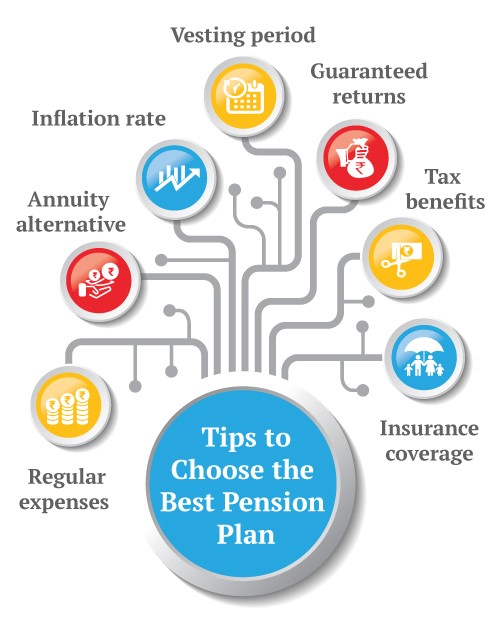Is pension taxable? A question that bothers almost every taxpayer close to retirement. However, the answer is more than just a simple yes or no.
A pension is a stream of fixed amounts paid each month post-retirement. Pension is a replacement of salary income so that you continue maintaining your standard of living post-retirement. If a pension is meant to replace income, is pension taxable just like salary income?
Pension pay outs are treated as income and hence normally taxable depending on the tax slab that you fall in. Such pension pay outs are termed uncommuted pensions.
There is another type of pension called commuted pension. In commuted pension, you may choose to receive a certain portion of your pension, in advance.
For example, if you choose to receive 10% of your monthly pension (Rs 10,000) for the next 10 years as a lumpsum amount, you will receive:
10% of Rs 10,000 X 12 months X 10 years = Rs 1,20,000.
You may withdraw Rs 1.2 lakhs as a lump sum amount and the balance of Rs 9,000 per month would be paid out for 10 years. You will receive Rs 10,000 per month from the 11th year. This is called commuted pension.
Taxability of Commuted and Uncommuted Pension
All uncommuted pensions are taxable as salary when received.
The tax treatment for commuted pensions is slightly different. The uncommuted monthly pay out (in the above example) of Rs 9000 is fully taxable for 10 years and Rs 10,000 (from the 11th year) is fully taxable.
- If you work(ed) for a government body or corporation your commuted pension is exempt from tax under Section 10(10A)
- If you do not work for a government body or corporation, you will be taxed as follows:
- If you receive gratuity along with your pension, the tax exemption is equal to one-third of the commuted pension.
- If you do not receive gratuity along with your pension, the tax exemption is equal to one-half of the commuted pension.
Tax on Pension Income After Retirement
If you are below 60 and volunteered for early retirement, your income from pension and/or other sources will be taxed if the total income is above the exemption limit:
1. Old Tax Regime
Tax Slabs for Resident Individuals below 60 years of age and HUF
- Pension/total income from all sources < Rs 2.5 lakhs: Nil taxes
- Pension/total income from all sources is between Rs 2.5 lakhs and Rs 5 lakhs: 10% tax
- Pension/total income from all sources is between Rs 5 lakhs and Rs 10 lakhs: 20% tax
- Pension/total income from all sources > Rs 10 lakhs: 30% tax
The tax slabs for senior citizens (60 years above but below 80 years of age) are listed below:
- Pension/total income from all sources < Rs 3 lakhs: Nil taxes
- Pension/total income from all sources is between Rs 3 lakhs and Rs 5 lakhs: 10% tax
- Pension/total income from all sources is between Rs 5 lakhs and Rs 10 lakhs: 20% tax
- Pension/total income from all sources > Rs 10 lakhs: 30% tax
For senior citizens of 80 years and above, income up to Rs 5 lakhs is exempt from income taxes and the slab starts with a 20% tax rate.
2. New Tax Regime
The new concessional tax regime is an option available to you for taxation with lower tax rates. However, the regime does not allow the carry forward of losses and adjustment of losses under other heads of income. Also, deductions under sections 80C, 80D, 80TTB and HRA are not allowed under the New Tax Regime.
Only tax relief under section 87A will be allowed when applicable.
The tax rates (applicable for all age groups) under the New Tax Regime are as follows:
| Income Tax Slab | Income Tax Slab |
|---|---|
| Up to ₹ 2,50,000 | Nil |
| ₹ 2,50,001 - ₹ 5,00,000 | 5% above ₹ 2,50,000 |
| ₹ 5,00,001 - ₹ 7,50,000 | ₹ 12,500 + 10% above ₹ 5,00,000 |
| ₹ 7,50,001 - ₹ 10,00,000 | ₹ 37,500 + 15% above ₹ 7,50,000 |
| ₹ 10,00,001 - ₹ 12,50,000 | ₹ 75,000 + 20% above ₹ 10,00,000 |
| ₹ 12,50,001 - ₹ 15,00,000 | ₹ 1,25,000 + 25% above ₹ 12,50,000 |
| Above ₹ 15,00,000 | ₹ 1,87,500 + 30% above ₹ 15,00,000 |
A Health & Education Cess will apply at a rate of 4% on the amount of income tax plus Surcharge (if any) under both the regimes.
Tax on Pension Received by Family Member
In case of your unfortunate, untimely demise, your nominee/family member would receive your pension:
- In the case of government employees, the spouse, by default, is eligible to receive the pension.
- If you have nominated your child to receive a pension, after you, only children up to 25 years of age, or until they get married or until they start earning a monthly income > Rs 9,000 per month (whichever is earlier) are eligible.
- If the son or daughter, is suffering from any disorder or disability to render him or her unable to earn a living even after attaining the age of 25 years, the pension can continue to be paid for a lifetime subject to conditions.
Click here - Temporary Disability Insurance
- Even dependent parents are eligible if the government servant is not survived by a spouse or eligible child. The pension will be payable to the mother first, failing which to the father.
Such pension is taxed under the head ‘income from other sources’ in the taxpayer’s income tax return.
- Commuted pensions are not taxable
- Uncommuted pensions are exempt to up to Rs 15,000 or 1/3rd of the uncommuted pension received
For example – If the pension is Rs 100,000, the exemption available lower of Rs 15,000 and Rs 33,333 (1/3rd of Rs 1,00,000).
Therefore, the taxable pension becomes Rs 85,000 (Rs 100,000 – Rs 15,000).
How to Receive Tax-Free Pension?
Investing in the right financial avenues can help you get cash flows, exempt from taxes, post-retirement. You must explore some of these options to live comfortably in your 2nd innings:
1. Tax-Free Bonds
Tax-free bonds are brilliant alternatives for senior citizens who want good returns and a regular income. As they are issued either by the government or government-backed organizations, they are absolutely risk-free as well.
The coupon payments from tax-free bonds are exempt from income tax.
2. Unit Linked Insurance Plans (ULIPs)
a. Investments in ULIPs can be deducted from taxable income u/s 80C
b. Returns from ULIPs are tax-free if the annual premium on all ULIPs combined has been above Rs 2.5 lakhs
c. ULIPs allow partial withdrawals after five years of investment
d. ULIPs like Invest 4G from Canara HSBC Life Insurance allow you to invest up to the age of 99. Thus,
i. You can build your retirement corpus in the plan till the age of 60-65
ii. Withdraw tax-free pension after 60 using systematic withdrawal option
e. The sum assured will not be taxed in the case of death of the policyholder
3. Equity Shares or Mutual Funds
If you stay invested in an equity mutual fund or stock for more than a year, your investment is treated as a long-term capital asset. Long-term capital gains from equity investments are exempt up to Rs 1 lakh in a financial year.
Thus, you can use equity investments to build your tax-free pension, where withdrawals with capital gains (long-term) of up to Rs 1 lakh will be tax-free.
Pension is an excellent source of guaranteed cash flows to sustain your lifestyle post-retirement. There are several alternative investment options as well that give inflation-beating, tax-free returns. Diversifying your investments across multiple such options can give you both adequate money and peace of mind when you need it the most.
Disclaimer: This article is issued in the general public interest and meant for general information purposes only. Readers are advised to exercise their caution and not to rely on the contents of the article as conclusive in nature. Readers should research further or consult an expert in this regard.
Retirement - Top Selling Plans
We bring you a collection of popular Canara HSBC life insurance plans. Forget the dusty brochures and endless offline visits! Dive into the features of our top-selling online insurance plans and buy the one that meets your goals and requirements. You and your wallet will be thankful in the future as we brighten up your financial future with these plans.
Fixed Returns, Zero Risks & Worries
- 4 Plan options
- Life cover + Guaranteed benefits
- Accidental death benefit
- Premium protection cover
Retire Grand with Flexi Benefits
- Guaranteed Lifelong Income
- Limited premium payment term
- Multiple annuity options
- Option to defer the annuity payments
Save, Dream, Plan. Live Peacefully
- 4 Plan options
- Option to choose premium payment term
- Get Tax benefits
- Premium protection cover
Recent Blogs





Popular Searches
- Retirement Calculator
- Best Retirement Plan
- Senior Citizen Card
- Saral Pension Plan
- NPS Withdrawal
- Pension4Life Plan
- Retirement Planning
- 5 Retirement Tips
- National Pension Scheme
- NPS Pension Calculator
- Types of Pension Plan
- Guaranteed Pension Plan
- Is Pension Taxable
- How to Check Old Age Pension Status
- Benefits of Pension Plan

